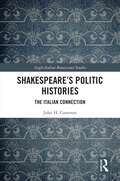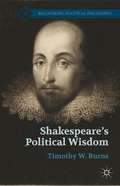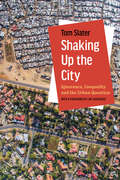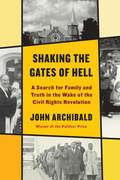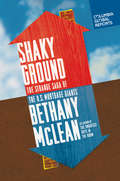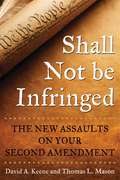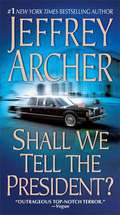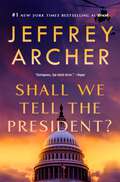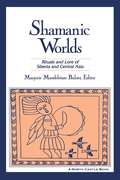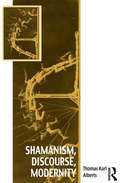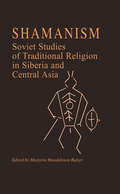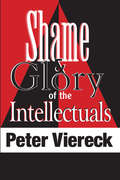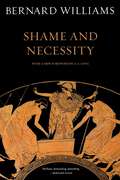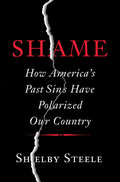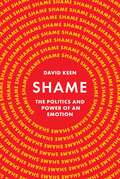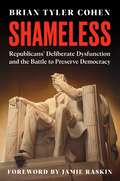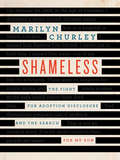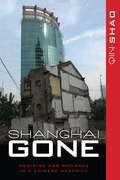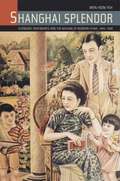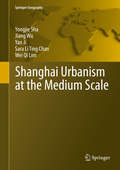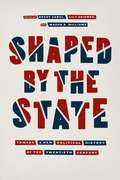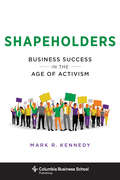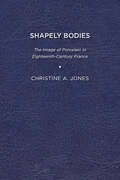- Table View
- List View
Shakespeare’s Politic Histories: The Italian Connection (Anglo-Italian Renaissance Studies)
by John H. CameronThis book argues that Shakespeare's first tetralogy is informed by the Italian ‘politic histories’ of the early modern period, those works of history, inspired by the Roman historian Tacitus, that sought to explore the machinations of power politics in governance and in the shaping of historical events; that a close reading of these Italian ‘politic histories’ will greatly aid our understanding of the ‘politic’ qualities dramatized in Shakespeare’s early English History plays; that the writings of Niccolò Machiavelli in particular will likewise aid to such understanding; that these ‘politic histories’ were available (in a variety of forms) to many English early modern writers, Shakespeare included, and are thus helpful as grounds for political and strategic analogy and for informing our reading of Shakespeare's politic histories. While a reading of the Italian ‘politic’ historians can aid in our understanding of Shakespeare’s achievement, we should regard the English History plays as ‘politic histories’ in their own right, i.e. as dramatized versions of precisely the same kinds of ‘politic’ historical writing, with its emphasis on ragion di Stato or raison d’état. This emphasis on what the Elizabethans called ‘stratagems’ suggests new ways to read the plays and to interpret the motivation and action of its characters, ways that challenge some of our more established reading of the plays’ ‘Machiavellian’ characters (particularly Richard III) and suggest far greater strategic acumen on the part of previously overlooked characters (particularly Buckingham and Stanley), providing new ways to read the Shakespeare's politic histories and to better appreciate their Italian connection.
Shakespeare’s Political Wisdom
by Timothy W. BurnsWinner of 2014 CHOICE Outstanding Academic Title Award, Shakespeare's Political Wisdom offers careful interpretations of five Shakespearean plays –Julius Caesar, Macbeth, The Merchant of Venice, King Lear, and The Tempest–with a view to the enduring guidance those plays can provide to human, political life. The plays have been chosen for their relentless attention to the questions that, for Shakespeare, form the heart and soul of politics: Who should rule, and what is justice? Burns provides an original reading of the plays through the lens of political philosophy rather than Theatre or Renaissance Studies. Shakespeare's wisdom found in these five plays, Burns concludes, provides a deeply relevant critique of our contemporary civic culture.
Shaking Up the City: Ignorance, Inequality, and the Urban Question
by Tom SlaterShaking Up the City critically examines many of the concepts and categories within mainstream urban studies that serve dubious policy agendas. Through a combination of theory and empirical evidence, Tom Slater "shakes up" mainstream urban studies in a concise and pointed fashion by turning on its head much of the prevailing wisdom in the field. To this end, he explores the themes of data-driven innovation, urban resilience, gentrification, displacement and rent control, neighborhood effects, territorial stigmatization, and ethnoracial segregation. With important contributions to ongoing debates in sociology, geography, urban planning, and public policy, this book engages closely with struggles for land rights and housing justice to offer numerous insights for scholarship and political action to guard against the spread of an urbanism rooted in vested interest.
Shaking the Gates of Hell: A Search for Family and Truth in the Wake of the Civil Rights Revolution
by John ArchibaldOn growing up in the American South of the 1960s--an all-American white boy--son of a long line of Methodist preachers, in the midst of the civil rights revolution, and discovering the culpability of silence within the church. By the Pulitzer Prize-winning journalist and columnist for The Birmingham News." <P><P>My dad was a Methodist preacher and his dad was a Methodist preacher," writes John Archibald. "It goes all the way back on both sides of my family. When I am at my best, I think it comes from that sermon place." <P><P>Everything Archibald knows and believes about life is "refracted through the stained glass of the Southern church. It had everything to do with people. And fairness. And compassion." <P><P>In Shaking the Gates of Hell, Archibald asks: Can a good person remain silent in the face of discrimination and horror, and still be a good person? <P><P>Archibald had seen his father, the Rev. Robert L. Archibald, Jr., the son and grandson of Methodist preachers, as a moral authority, a moderate and a moderating force during the racial turbulence of the '60s, a loving and dependable parent, a forgiving and attentive minister, a man many Alabamians came to see as a saint. But was that enough? Even though Archibald grew up in Alabama in the heart of the civil rights movement, he could recall few words about racial rights or wrongs from his father's pulpit at a time the South seethed, and this began to haunt him. In this moving and powerful book, Archibald writes of his complex search, and of the conspiracy of silence his father faced in the South, in the Methodist Church and in the greater Christian church. Those who spoke too loudly were punished, or banished, or worse. Archibald's father was warned to guard his words on issues of race to protect his family, and he did. He spoke to his flock in the safety of parable, and trusted in the goodness of others, even when they earned none of it, rising through the ranks of the Methodist Church, and teaching his family lessons in kindness and humanity, and devotion to nature and the Earth. <P><P>Archibald writes of this difficult, at times uncomfortable, reckoning with his past in this unadorned, affecting book of growth and evolution.
Shaky Ground
by Bethany McleanIn a way, the situation is ironic: housing was at the root of the financial crisis, and six years after the meltdown, housing finance is still the greatest unsolved issue. The U.S. housing market is roughly $10 trillion, making it one of the largest segments of the bond market. Roughly 70 percent of the American population has a mortgage, and for most people, the mortgage is the most important financial instrument in their lives. But until the financial crisis, few people knew the essential role that Fannie Mae and Freddie Mac play in their mortgages. Given the $188 billion government bailout of the two firms - the most expensive bailout in history - the politics surrounding housing are worse than they've ever been, and the two gigantic firms sit in limbo. Best-selling investigative journalist Bethany McLean, the coauthor of The Smartest Guys in the Room and All the Devils Are Here, explains why the situation is dangerous and unsustainable, and proposes a few solutions - from the perfect, but politically unfeasible to the doable, but ugly.
Shall Not Be Infringed: The New Assaults on Your Second Amendment
by Thomas L. Mason David A. KeeneShall Not be Infringed: The New Assaults on Your Second Amendment is a history of the relatively short gun control debate in America and a revealing description of how those hostile to the Second Amendment use polls, studies, and numbers to confuse the public. Expert pro-gun advocates David Keene and Thomas Mason tell the story of the battle fought in the courts, Congress, and state legislatures across the country as well as in the media and even the United Nations. Guns have become a symbol over which battle after battle is fought, all the while hiding the end game of a cultural shift to government dominance.Although the Supreme Court ruled the Second Amendment guarantees an individual right to "keep and bear arms," candidate Clinton and the Democratic Party have promised to pick Supreme Court justices who will overturn this ruling. Gun control advocates insist the Court was wrong and a new Court should reverse that finding, stripping American gun owners of the Constitutional protection that has thus far made it impossible to ban gun ownership.Addressing vital issues such as deterring and preventing crime, troubling presidential and Congressional politics, problematic anti-gun proposals, and so much more, Shall Not Be Infringed is an essential read for our times.
Shall We Tell The President?
by Jeffrey ArcherAfter years of great sacrifice and deep personal tragedy, Florentyna Kane's has finally become the first woman president in America. But on the very day that she is sworn into office, powerful forces are already in motion to take her life. The FBI investigates thousands of false threats every year. This time, a reliable source has tipped them off about an assassination attempt. One hour later, the informant and all but one of the investigating agents are dead. The lone survivor: FBI Special Agent Mark Andrews. Now, only he knows when the killers will strike. But how can he alone unravel a ruthless conspiracy--in less than one week? The race to save the first woman president begins now. . .
Shall We Tell the President?
by Jeffrey ArcherMaster storyteller Jeffrey Archer keeps the pace sizzling in this final installment in the Kane and Abel trilogy, Shall We Tell the President?, a daring political thriller where treason and betrayal threaten to topple an American dynasty. After years of great sacrifice and deep personal tragedy, Florentyna Kane has finally become the first woman president in America. But on the very day that she is sworn into office, powerful forces are already in motion to take her life. The FBI investigates thousands of false threats every year. This time, a reliable source has tipped them off about an assassination attempt. One hour later, the informant and all but one of the investigating agents are dead. The lone survivor: FBI Special Agent Mark Andrews. Now, only he knows when the killers will strike. But how can he alone unravel a ruthless conspiracy—in less than one week? The race to save the first woman president begins now…
Shamanic Worlds: Rituals and Lore of Siberia and Central Asia
by Marjorie Mandelstam BalzerThe ancient heartland of shamanism is no longer forbidden territory - to travelers or to the spirits. But the spirits never left the vastnesses of Siberia and Central Asia, as these writings reveal. Russian and native experts, and an American cultural anthropologist who has done fieldwork in the region, introduce us to shamans as the poets, therapists, healers, and even leaders of their communities. Among the special features of this collection are remarkable transcriptions of shamanic exhortations and a pathbreaking study of shamanic tales and rituals.
Shamanism, Discourse, Modernity (Vitality of Indigenous Religions)
by Thomas Karl AlbertsShamanism, Discourse, Modernity considers indigenous peoples’ struggles for human rights, anxieties about anthropocentric mastery of nature, neoliberal statecraft, and entrepreneurialism of the self. The book focuses on four domains - shamanism, indigenism, environmentalism and neoliberalism - in terms of interrelated historical processes and overlapping discourses. In doing so, it engages with shamanism’s manifold meanings in a world increasingly sensitive to indigenous peoples’ practices of territoriality, increasingly concerned about humans’ integral relationship with natural environments, and increasingly encouraged and coerced to adjust self-conduct to comport with and augment government conduct.
Shamanism: Soviet Studies of Traditional Religion in Siberia and Central Asia
by Marjorie Mandelstam BalzerAddresses the most important theoretical and practical problems underlying public budgeting. This anthology is organized topically rather than historically, with an effort to delineate the issues needed to understand some of the controversies in the field. It describes what public budgeting is, where it comes from, and what it is for.
Shame and Glory of the Intellectuals: Babbitt Jr. Vs. The Rediscovery Of Values
by Peter ViereckIn this classic volume, written at the height of the Cold War, with a new preface of 2006, Peter Viereck, one of the foremost intellectual spokesmen of modern conservatism, examines the differing responses of American and European intellectuals to the twin threats of Nazism and Soviet communism. In so doing, he seeks to formulate a humanistic conservatism with which to counter the danger of totalitarian thought in the areas of politics, ethics, and art.The glory of the intellectuals was the firm moral stance they took against Nazism at a time when appeasement was the preferred path of many politicians; their shame lay in their failure to recognize the brutality of Stalinism to the extent of becoming apologists for or accomplices of its tyranny. In Viereck's view, this failure is rooted in an abandonment of humane values that he sees as a legacy of nineteenth-century romanticism and certain strands of modernist thought and aesthetics.Among his targets are literary obscurantism as personified by Ezra Pound, the academicization of literary culture, the rigidity of adversarial avant-gardism, and the failure of many writers and cultural institutions to conserve the very heritage their political freedom and security depend on. Viereck represents their attitude in a series of satirical dialogues with Gaylord Babbitt, son of Sinclair Lewis' embodiment of conservative philistinism. Babbitt Junior is as unreflective as his father, but the objects of his credulity are the received ideas of liberal progressivism and avant-garde mandarinism. Ultimately, Viereck's critique stands as a timely rebuke to the extremism of both left and right.
Shame and Necessity, Second Edition (Sather Classical Lectures #57)
by Bernard WilliamsWe tend to suppose that the ancient Greeks had primitive ideas of the self, of responsibility, freedom, and shame, and that now humanity has advanced from these to a more refined moral consciousness. Bernard Williams's original and radical book questions this picture of Western history. While we are in many ways different from the Greeks, Williams claims that the differences are not to be traced to a shift in these basic conceptions of ethical life. We are more like the ancients than we are prepared to acknowledge, and only when this is understood can we properly grasp our most important differences from them, such as our rejection of slavery.The author is a philosopher, but much of his book is directed to writers such as Homer and the tragedians, whom he discusses as poets and not just as materials for philosophy. At the center of his study is the question of how we can understand Greek tragedy at all, when its world is so far from ours.Williams explains how it is that when the ancients speak, they do not merely tell us about themselves, but about ourselves. In a new foreword A.A. Long explores the impact of this volume in the context of Williams's stunning career.
Shame: How America's Past Sins Have Polarized Our Country
by Shelby SteeleThe greatest barrier to racial equality today is not overt racism, Shelby Steele argues in [Title TK], but white liberals. Under the guise of benevolence, liberals today maintain their position of power over blacks by continuing to cast them as victims in need of saving. This ideology underlies liberal social policies from affirmative action to welfare, which actually exacerbate racial inequality rather than mitigating it. Drawing on empirical data as well as his own personal experience, Steele demonstrates that these policies have not only failed, but have made it impossible to address the problems that plague the modern black community, and have ensured that black Americans will never be truly equal to their white countrymen, in their own minds or in practice. Forthright and persuasive, [Title TK] offers an unflinching look at the failures of liberalism and a compelling case that a return to conservative principles is the only way forward for African Americans--and for the nation.
Shame: The Politics and Power of an Emotion
by David KeenThe uses of shame (and shamelessness) in spheres that range from social media and consumerism to polarized politics and mass violenceToday, we are caught in a shame spiral—a vortex of mutual shaming that pervades everything from politics to social media. We are shamed for our looks, our culture, our ethnicity, our sexuality, our poverty, our wrongdoings, our politics. But what is the point of all this shaming and countershaming? Does it work? And if so, for whom?In Shame, David Keen explores the function of modern shaming, paying particular attention to how shame is instrumentalized and weaponized. Keen points out that there is usually someone who offers an escape from shame—and that many of those who make this offer have been piling on shame in the first place. Self-interested manipulations of shame, Keen argues, are central to understanding phenomena as wide-ranging as consumerism, violent crime, populist politics, and even war and genocide. Shame is political as well as personal. To break out of our current cycle of shame and shaming, and to understand the harm that shame can do, we must recognize the ways that shame is being made to serve political and economic purposes.Keen also traces the rise of leaders on both sides of the Atlantic who possess a dangerous shamelessness, and he asks how shame and shamelessness can both be damaging. Answering this question means understanding the different types of shame. And it means understanding how shame and shamelessness interact—not least when shame is instrumentalized by those who are selling shamelessness. Keen points to a perverse and inequitable distribution of shame, with the victims of poverty and violence frequently being shamed, while those who benefit tend to exhibit shamelessness and even pride.
Shameless: Republicans' Deliberate Dysfunction and the Battle to Preserve Democracy
by Brian Tyler CohenFrom the first content creator to interview President Biden, leading progressive voice Brian Tyler Cohen takes a step back from the day-to-day news cycle to explain how American politics has turned into such a dumpster fire—and what Democrats need to do to get us out of it. <P><P> In Shameless, Brian Tyler Cohen lays bare the long con of the modern Republican Party. While the radical right continues hiding behind gaslighting maneuvers, artificial slogans, and hollow catchphrases, Cohen’s unflinching narrative illuminates the realities and dangers of the ever-widening gulf between the vaunted Republican brand and their actual behavior. <P><P> With a foreword by Congressman Jamie Raskin, drawing on interviews and insights from Pete Buttigieg, Mehdi Hasan, Jen Psaki, and other luminaries of the Left, Cohen reveals: <P> <P>• How Republicans have leaned on their historical branding to give themselves a permission structure to behave antithetically to everything they say; <P>• Why the mainstream media has proved itself a willing participant in this ongoing farce— particularly since the rise of toxic, sensationalist MAGA mania; and <P>• What lessons Democrats can glean from a clear-eyed view of the landscape we’re operating in—and the steps we must take to rebalance our political landscape. <P><P> During this all-hands-on-deck moment in our history, Shameless is essential reading for those seeking to understand our dire situation, and a rallying cry for those fighting to preserve democracy. <p> <b>New York Times Bestseller</b>
Shameless: The Fight for Adoption Disclosure and the Search for My Son
by Marilyn ChurleyIn the late 1960s, at the age of eighteen and living far from home amidst the thriving counterculture of Ottawa, Marilyn Churley got pregnant. Like thousands of other women of the time she kept the event a secret. Faced with few options, she gave the baby up for adoption. Over twenty years later, as the Ontario NDP government’s minister responsible for all birth, death, and adoption records, including those of her own child, Churley found herself in a surprising and powerful position – fully engaged in the long and difficult battle to reform adoption disclosure laws and find her son. Both a personal and political story, Shameless is a powerful memoir about a mother’s struggle with loss, love, secrets, and lies – and an adoption system shrouded in shame.
Shanghai Gone: Domicide and Defiance in a Chinese Megacity (State & Society in East Asia)
by Qin Shao&“One of the best accounts of the reality of gentrification and urban development in China . . . grounded with solid historical, ethnographic and legal evidence&” (Urban Studies). In recent decades, the centuries-old city of Shanghai has been demolished and rebuilt into a gleaming megacity. With its world famous skyscrapers, it now ranks with New York and London as a hub of global finance. But that transformation has come at a grave human cost. In Shanghai Gone, Qin Shao applies the concept of domicide—the eradication of a home against the will of its dwellers—to the sweeping destruction of neighborhoods, families, and life patterns that made way for the new Shanghai. Shao gives voice to the holdouts and protesters who resisted domicide and demanded justice. She follows, among others, a reticent kindergarten teacher turned diehard petitioner; a descendant of gangsters and squatters who has become an amateur lawyer for evictees; and a Chinese Muslim who has struggled to recover his ancestral home in Xintiandi, an infamous site of gentrification dominated by a well-connected Hong Kong real estate tycoon. Highlighting the wrenching changes spawned by China&’s reform era, Shao vividly portrays the corrupt and rapacious pursuit of growth and profit, the personal wreckage it has left behind, and the enduring human spirit it has unleashed.
Shanghai Splendor: Economic Sentiments and the Making of Modern China, 1843-1949
by Wen-Hsin YehRich with details of everyday life, this multifaceted social and cultural history of China's leading metropolis in the twentieth century offers a kaleidoscopic view of Shanghai as the major site of Chinese modernization. Engaging the entire span of Shanghai's modern history from the Opium War to the eve of the Communist takeover in 1949, Wen-hsin Yeh traces the evolution of a dazzling urban culture that became alternately isolated from and intertwined with China's tumultuous history. Looking in particular at Shanghai's leading banks, publishing enterprises, and department stores, she sketches the rise of a new maritime and capitalist economic culture among the city's middle class. Making extensive use of urban tales and visual representations, the book captures urbanite voices as it uncovers the sociocultural dynamics that shaped the people and their politics.
Shanghai Urbanism at the Medium Scale
by Jiang Wu Yongjie Sha Yan Ji Sara Li Ting Chan Wei Qi LimThis book focuses on observing and understanding the urban planning and relevant development patterns applied to the creation of urban districts against the backdrop of the current rapid urbanization and transformation of Shanghai on its way to becoming a world city. Based on a review of the four stages of city evolution, a series of case studies on typical urban districts through the city's building history to date points out key issues in connection with current developments. Three rapidly developing districts in Shanghai are studied with regard to alternative urban planning and design solutions, and further opinions from other perspectives including city government, real estate development and professional education, reveal challenges in the practical implementation of changes. This book indeed provides an approach to in-depth observation and understanding of urban planning and current development patterns at the medium scale of Chinese urbanization for those from academic, professional, investment, public administration and related circles who would like to join the urban transformation process. Associate Professor Yongjie Sha and Professor Jiang Wu work at Tongji University. Yan Ji is an architect and urban designer in Shanghai. Sara Li Ting Chan and Wei Qi Lim work in Singapore as architect and planner in government service.
Shantytown, USA: Forgotten Landscapes of the Working Poor
by Lisa GoffShantytowns once occupied a central place in America's urban landscape. Lisa Goff shows how these resourceful dwellings were not merely the byproducts of hardship but potent assertions of self-reliance. Their legacy is felt in sites of political activism, from campus shanties protesting apartheid to the tent cities of Occupy Wall Street.
Shape of the Suburbs
by John SewellIt is now impossible to understand major North American cities without considering the seemingly never-ending and ever-growing sprawl of their surrounding suburbs. In The Shape of the Suburbs, activist, urban affairs columnist, and former Toronto mayor John Sewell examines the relationship between the development of suburbs, water and sewage systems, highways, and the decision-making of Toronto-area governments to show how the suburbs spread, and how they have in turn shaped the city. Using his wealth of knowledge of the city of Toronto and new information gathered from municipal archives, Sewell describes the major movements and forces that allowed for rapid development of the suburbs, while considering the options that were available to planners at the time. Discussing proposals to curb suburban sprawl from the 1960s to the recently adopted plan for the Greater Toronto area, Sewell combines insightful and accessible commentary with rigorous research on the debate between urban and suburban. Concerned not only with sprawl, The Shape of the Suburbs also demonstrates the ways in which suburban political, economic, and cultural influences have impacted the older, central city, culminating in the forced Megacity amalgamation of 1998. Rich in detail and full of useful visual illustrations, The Shape of the Suburbs is a lively look at the construction of the suburban era.
Shaped by the State: Toward a New Political History of the Twentieth Century
by Lily Geismer Mason B. Williams Brent CebulAmerican political history has been built around narratives of crisis, in which what “counts” are the moments when seemingly stable political orders collapse and new ones rise from the ashes. But while crisis-centered frameworks can make sense of certain dimensions of political culture, partisan change, and governance, they also often steal attention from the production of categories like race, gender, and citizenship status that transcend the usual break points in American history. Brent Cebul, Lily Geismer, and Mason B. Williams have brought together first-rate scholars from a wide range of subfields who are making structures of state power—not moments of crisis or partisan realignment—integral to their analyses. All of the contributors see political history as defined less by elite subjects than by tensions between state and economy, state and society, and state and subject—tensions that reveal continuities as much as disjunctures. This broader definition incorporates investigations of the crosscurrents of power, race, and identity; the recent turns toward the history of capitalism and transnational history; and an evolving understanding of American political development that cuts across eras of seeming liberal, conservative, or neoliberal ascendance. The result is a rich revelation of what political history is today.
Shapeholders: Business Success in the Age of Activism (Columbia Business School Publishing)
by Mark KennedyToday, all it takes is one organizational misstep to sink a company's reputation. Social media can be a strict ethical enforcer, with the power to convince thousands to boycott products and services. Executives are stuck on appeasing stakeholders—shareholders, employees, and consumers—but they ignore shapeholders, regulators, the media, and social and political activists who have no stake in a company but will work hard to curb what they see as bad business practices. And they do so at their own peril.In Shapeholders: Business Success in the Age of Activism, former congressman, Fortune 500 executive, and university president Mark Kennedy argues that shapeholders, as much as stakeholders, have significant power to determine a company's risks and opportunities, if not its survival. Many international, multi-billion-dollar corporations fail to anticipate activism, and they flounder on first contact. Kennedy zeroes in on the different languages that shapeholders and companies speak and their contrasting metrics for what constitutes acceptable business practice. Executives, he argues, must be visionaries who find profitable—and probable—collaborations to diffuse political tensions. Kennedy's decision matrix helps corporations align their business practices with shapeholder interests, anticipate their demands, and assess changing moral standards so that together they can plan a profitable route forward.
Shapely Bodies: The Image of Porcelain in Eighteenth-Century France (Studies in Seventeenth- and Eighteenth-Century Art and Culture)
by Christine A. JonesShapely Bodies: The Image of Porcelain in Eighteenth-Century France constructs the first cultural history of porcelain making in France. It takes its title from two types of “bodies” treated in this study: the craft of porcelain making shaped clods of earth into a clay body to produce high-end commodities and the French elite shaped human bodies into social subjects with the help of makeup, stylish patterns, and accessories. These practices crossed paths in the work of artisans, whose luxury objects reflected and also influenced the curves of fashion in the eighteenth century. French artisans began trials to reproduce fine Chinese porcelain in the 1660s. The challenge proved impossible until they found an essential ingredient, kaolin, in French soil in the 1760s. Shapely Bodies differs from other studies of French porcelain in that it does not begin in the 1760s at the Sèvres manufactory when it became technically possible to produce fine porcelain in France, but instead ends there. Without the secret of Chinese porcelain, artisans in France turned to radical forms of experimentation. Over the first half of the eighteenth century, they invented artificial alternatives to Chinese porcelain, decorated them with French style, and, with equal determination, shaped an identity for their new trade that distanced it from traditional guild-crafts and aligned it with scientific invention. The back story of porcelain making before kaolin provides a fascinating glimpse into the world of artisanal innovation and cultural mythmaking. To write artificial porcelain into a history of “real” porcelain dominated by China, Japan, and Meissen in Saxony, French porcelainiers learned to describe their new commodity in language that tapped into national pride and the mythic power of French savoir faire. Artificial porcelain cut such a fashionable image that by the mid-eighteenth century, Louis XV appropriated it for the glory of the crown. When the monarchy ended, revolutionaries reclaimed French porcelain, the fruit of a century of artisanal labor, for the Republic. Tracking how the porcelain arts were depicted in documents and visual arts during one hundred years of experimentation, Shapely Bodies reveals the politics behind the making of French porcelain’s image. Published by University of Delaware Press. Distributed worldwide by Rutgers University Press.
